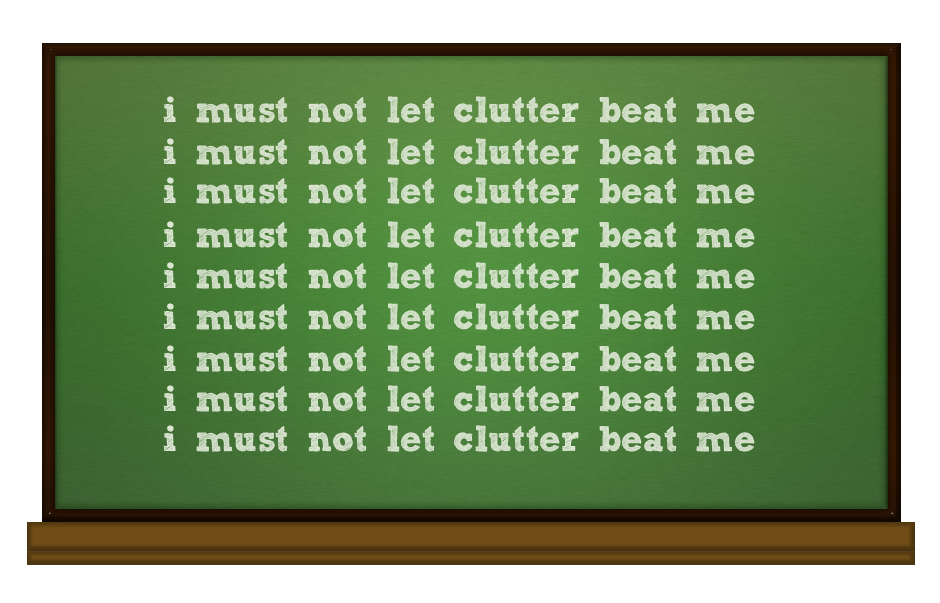Is Clutter Good?

By:
Junk has a way of piling up until it’s too overwhelming to tackle: old clothes, useless VHS tapes, and worn-down furniture inexplicably become harder to throw away the more time they collect dust in the basement. However, clutter is more than just a waste of space or an inconvenience. It is also bad for our mental health.
The impact of clutter on mental health.
Studies show that clutter and disorganization in the home are a major source of stress and anxiety for Americans. A Huffington Post stress poll from 2013 shows that 84 percent of those surveyed said they felt anxiety because their home wasn’t clean or organized, with 55 percent within that group labeling it a major source of stress.
Psychology Today has also noted that excessive clutter leads to feelings of anxiety, shame, embarrassment, and depression. Paralyzing disorganization can even be an extenuating symptom of depression and grief. And we’re not just talking about people who have extreme hoarding habits or Obsessive Compulsive Disorder (OCD). This is the day-to-day, seemingly innocuous clutter secretly taking an emotional toll.
Dr. Anne Marie Albano, Director of the Columbia University Clinic for Anxiety and Related Disorders, says that for many of her patients struggling with anxiety, clutter adds to the burden, increasing general feelings of heaviness and unease. "Patients who report worries related to clutter are mainly focused on the fear of some untoward consequence of letting things go, such as 'But what if I need those receipts again to do a budget?' or 'I’ll forget my loved one if I don’t save all of these things that belonged to him/her,'" Albano says. "Throwing things away or letting go feels painful to them and is avoided at all costs."
 Sean MacEntee / Flickr - flic.kr
Sean MacEntee / Flickr - flic.kr
There are ways to alleviate the clutter.
The good news is that there is a fix for potentially stress-causing clutter. Of course there is the old fashioned method of sorting and discarding, or a new crop of apps and services can help you declutter.
One of these is Tradr, an interactive social app founded by a group of Harvard students in May that connects friends and neighbors through their stuff. Designed in a simple format similar to Tinder, Tradr allows anyone to buy, sell, trade or give away local goods by swiping left or right on a deck of images. It’s currently available for iOS devices in American and Brazilian app stores.
Zaki Djemal, CEO and co-founder of Tradr, says one of the app’s goals is to be easy to navigate, unlike overwhelming, poorly laid out sites like Ebay and Craigslist. "We wanted to reframe the choice, rather than limit the choice," Djemal says. "Tradr frees you from having too many options."
As a student of behavioral economics at Harvard, Djemal envisioned Tradr not only as a simplistic, sustainable way to create a growing market of used goods, but also as a tool to free people of their attachment to irrelevant objects. Like Albano, he points out that for many, the inability to throw out clutter is caused by an emotional block. Often people hold onto a loved one’s possessions after they have passed away or feel a sentimental draw into keeping objects that belong to an ex. "It weighs you down," Djemal says. "It’s important to ask: what are the items in my life that really make me happy?"
Jane Abrahams, founder of Jane’s Addiction, a home lifestyle service that offers a “stress-free approach to organization,” also agrees that there is often an emotional link with clutter. Abrahams works with clients directly to organize their homes and often helps prepare them for overwhelming moves. "My clients’ (as with most) lives are filled with busy work schedules, family and daily demands," she told ATTN:. "Organizing your home becomes the last focus…there is an emotional component, which contributes to the difficulty of letting go and purging. It is a very personal thing to invite someone into your home and face one’s reality.”
Having a clean, organized space can be transformative and freeing. Decluttering guru Marie Kondo, author of "The Life-Changing Magic of Tidying Up," has noted that “it’s typical to feel a sense of serenity” after a bout of organizational purging. An Inc. article also reports that out of more than 1,000 office workers surveyed in December 2010, 82 percent said they felt being organized improved their performance.
"If your home is clutter-free and organized, it creates a stress-free environment," Abrahams confirms.
Albano also finds that her patients who eventually tackle their clutter report positive feelings of “relief and accomplishment.”
It is definitely hard to feel motivated to organize. After a long day at work, it’s much more appealing to collapse in front of trashy TV than confront the actual garbage surrounding us. But with apps and organizations now dedicated to making this process painless, and with the connection between cleanliness and mental health becoming clearer, we’re running out of excuses.
